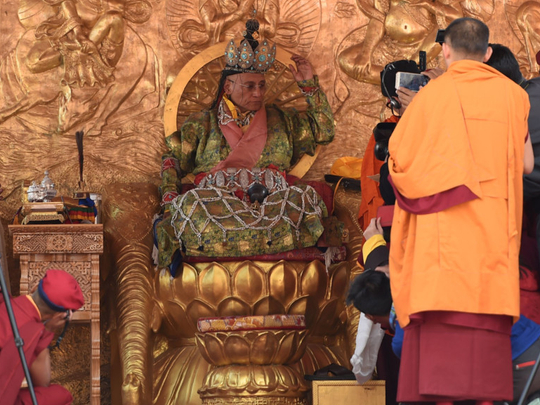
Leh: He is a “rock star monk” crooning songs of gender equality and harmony, of saving the Himalayas for the future — while cycling down the treacherous mountains of Ladakh.
Well, perhaps not crooning literally, but his interests, enthusiasm and activism are far removed from any religious personality that adorns the robe.
This Buddhist leader and active environmentalist — the 12th Gyalwang Drukpa — has a huge fan following among youngsters, in spite of his position and lineage. And it is they who have dubbed him the “rock star monk”.
The 17th century Hemis monastery which he heads is currently celebrating the fourth edition of the Naropa festival — a once-in-12-years carnival of Buddhist spirituality, culture and tradition — marking the 1,000th birth anniversary of the great Indian saint Naropa.
Sitting in a smaller monastery tucked away in the mountains, some 10km from the Hemis monastery, the 54-year-old Gyalwang Drukpa told IANS why he is not averse to the popular tag: “If people say I am a ‘rock star monk’ -- so be it, I am happy to agree.”
He said it’s good, as people follow rock stars — and it means they are also following him, what he’s preaching, be it gender neutrality or saving the natural world. “If I am successful in promoting gender equality it will definitely help in transforming ... refining the religion first,” he said.
“I have started initiating gender equality. This is my test and I am just testing the waters,” he said. “I am driving this issue in many ways. The main goal is not only to fight against gender stereotypes but promoting harmony among the people.”
Gyalwang Drukpa, the current spiritual head of the 1,000-year-old Drukpa Order based in the Himalayas, has just completed a two-month-long cycling expedition covering 2,500km with 200 of the globally famed “Kung-fu nuns”, all aged between 15 and 45 years.
He said the aim of the expedition — the fourth in a series, which started from the Druk Amitabha Mountain nunnery in Kathmandu on July 3 — was to spread the message of peace, gender equality and create awareness about the environment.
The spiritual leader believes religion is not a way of life, but a profession now.
“I normally say I don’t like religions — because they have adapted themselves according to people’s likes and dislikes. As such they are no longer a way of life,” said the Buddhist leader, also known as the “Guardian of the Himalayas”. “Religion is like a profession now and this profession is not exactly going according to nature.”
So what is he practising? He replied with typical humour: “Cycling,” and added, “Cycling is one of the important things we are promoting. We are also promoting (sapling) plantation and protecting the water in the Himalayas and elsewhere.”
Gyalwang Drukpa, recipient of the United Nations Millennium Development Goals Award, said: “Going around cycling, promoting plantations and gender equality — these are greater religions and I’m practising it.”
The maroon-robed monk, now recognised as a prominent voice for modern issues facing the Himalayas, says all through history women in the mountains have struggled to receive equal treatment. They were ostracised for practising spirituality.
Gyalwang Drukpa also founded the Druk Amitabha Mountain nunnery in Kathmandu which is an unique instance of gender reversal: the nuns run the administration. Over 300 nuns receive modern education, besides training in ancient Chinese martial arts.
On the conclusion of the festivities here, Gyalwang Drukpa will lead thousands of monks, nuns and volunteers on a 10-day-long “eco walk”, to the interiors of Ladakh to create awareness about the hazards of non-biodegradable waste — and pick up discarded plastic bottles, wrappers and cans along the way.
Drukpa beamed with satisfaction as he related how people here have given up using non-biodegradable plastic bottles and have switched to water filter system for tourists. “They are now setting up homestay units everywhere on my request. It’s very encouraging and I am optimistic about its success in this highly fragile ecosystem,” said the monk, who is associated with the Earth Awards Selection Committee that recognises viable innovations that improve the quality of life.











